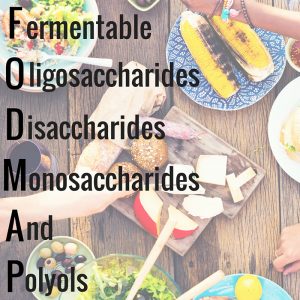News & Events
What is a FODMAP?
What is a FODMAP?
IBS and other digestive diseases can be very painful and hard to manage day in and day  out. A strategy that has been growing in popularity is the low FODMOP diet. As you know, many times problems with our digestive system and health overall can be seriously altered and improved by a change in our diet. This diet has been gaining in popularity and has been said to help reduce IBS and other digestive related flare-ups.
out. A strategy that has been growing in popularity is the low FODMOP diet. As you know, many times problems with our digestive system and health overall can be seriously altered and improved by a change in our diet. This diet has been gaining in popularity and has been said to help reduce IBS and other digestive related flare-ups.
What is a FODMOP?
FODMOP stands for Fermentable Oligosaccharides, Disaccharides, Monosaccharides And Polyols. Yep, it’s quite a mouthful, which explains the need for an acronym. The basic concept of the diet is to significantly reduce or completely cut out four things: Fermentable Oligosaccharides, Disaccharides, Monosaccharides And Polyols.
FODMOPS are “short-chain carbohydrates” that do not completely absorb in your digestive tract and thus are fermented by your gut bacteria. The sugars cause an osmosis effect that causes IBS symptoms like gas, diarrhea and stomach cramps.
Foods that contain FODMOPS
Fruits
- Apple
- Mango
- Pear
- Watermelon
- Apricot
- Avocado
- Blackberry
- Cherry
- Lychee
- Nectarine
- Peach
- Plum
- Prune
Sweeteners
- Fructose
- Corn syrup and high fructose corn syrup
- Sorbitol
- Mannitol
- Isomalt
- Maltitol
- Xylitol
Dairy
- Milk from cows, goats or sheep
- Custard
- Ice cream
- Yogurt
- Soft cheeses
- Cottage cheese
- Marscapone
- Ricotta
Veggies
- Asparagus
- Brussels sprouts
- Broccoli
- Cabbage
- Eggplant
- Fennel
- Garlic
- Leeks
- Okra
- Onion
- Shallots
- Cauliflower
- Peppers
- Mushrooms
- Corn
Cereals
- Wheat
- Rye
- Processed grains
Legumes
- Chickpeas
- Kidney beans
- Lentils
Other foods
- Coconut milk
- Dandelion
- Chicory
FODMOP intolerance
Most people with IBS have FODMOP intolerance but people who suffer from IBS are not the only people who have FODMOP intolerance. It can be developed by small intestinal bacterial overgrowth or by people who lack enough enzymes to break down and absorb the fermentable sugars before they reach the colon.
Further Reading:
Celiac Disease Test: When should you get screened